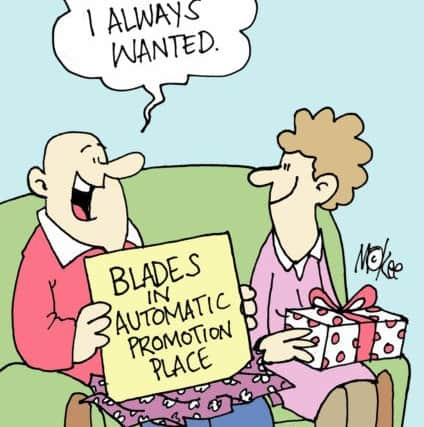Alan Biggs: Sheffield United pair Wilder and Knill and the rewards of battling from the bottom


So the fact that Chris Wilder and his Sheffield United sidekick Alan Knill come up against Northampton and Bury in the holiday programme is largely incidental.
Except for one thing. In both cases it shows the value of that somewhat out-dated concept, the managerial apprenticeship. Out-dated for three reasons:


Advertisement
Hide AdAdvertisement
Hide Ad* Clubs make random appointments, often without proper professional advice, and the increasing number of foreign owners has added to the unpredictability.
* “Name” players have an advantage – but how many are prepared to start at the bottom? Steven Gerrard was happy to be linked with MK Dons, a very big club of the lower levels, but that’s as far as he’d risk it.
* Managers of smaller clubs in the bottom two divisions have next to no chance of staying in position long enough to succeed.
So ... for Wilder and Knill to have come through all of that, to have tiptoed across the minefield to a club the size of the Blades, speaks volumes for their dedication and professionalism.


They’ve shown it is possible to survive. Just.
Advertisement
Hide AdAdvertisement
Hide AdMore importantly, I should think they are better at their job for it. Both are managers in their own right (Knill was number one when Wilder briefly joined him at Bury and the roles are now reversed).
United are nicely placed to benefit from this accumulation of knowledge as the pair set about using the potential of the place as a vehicle for advancing their own careers to the highest possible level.
Knill took Bury to the play-offs and then passed up a further shot at promotion to join Scunthorpe (hanging over the precipice in the Championship) the following year. I called it as a mistake at the time and history has borne that out, but we all live and learn.
Wilder’s gamble in forsaking a promotion attempt at Oxford for a battle to keep Northampton in the league looked riskier but was far more understandable, in my opinion. Maintaining the Cobblers’ status and later winning the League Two title were spectacular paybacks for a bloke backing himself to do it the hard way. Without that, he probably wouldn’t be in his dream job now.
Advertisement
Hide AdAdvertisement
Hide AdNone of this will have much of a bearing on what happens when Northampton visit the Lane on December 31st or when United go to Bury on January 2nd. Managers want to win every game and, besides, there’s no history or agenda.
But it is worthy of note for club chairmen on a wider basis to open their eyes to people who have been through the mill.